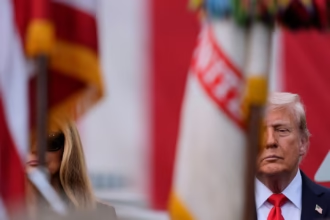The death of conservative commentator and Turning Point USA founder Charlie Kirk has ignited a firestorm of political and cultural conflict across the United States. While tributes poured in from supporters and allies, a very different reaction emerged from some liberal voices online—comments, jokes, and celebratory posts that mocked or cheered Kirk’s passing.
Now, right-wing activists say they are waging “war” on those individuals, organizing campaigns to identify, expose, and pressure their employers to take disciplinary action. The clash underscores the increasingly volatile intersection of politics, social media, and professional life in America’s polarized landscape.
A Digital Hunt Begins
Within hours of Kirk’s death making headlines, conservative influencers and grassroots activists began combing through social media for evidence of celebratory posts from liberal users. Screenshots of tweets, TikToks, and Facebook comments were circulated in right-wing forums and Telegram channels.
Prominent conservative activists claimed that celebrating the death of a political opponent crossed a moral line and warranted consequences. “These people are showing their true colors. They shouldn’t be allowed to hold positions of influence or responsibility,” one activist declared in a livestream watched by thousands.
From Call-Outs to Campaigns
What started as online outrage has quickly evolved into coordinated campaigns. Right-wing groups are now compiling lists of liberal users who publicly mocked Kirk’s death, tagging employers, universities, and professional associations in an effort to trigger investigations or terminations.
Several individuals targeted in these campaigns have already reported being contacted by their workplaces. Some received HR inquiries, while others say they were doxxed, with personal details shared online. Civil liberties advocates warn that these tactics risk escalating cycles of political harassment.
Liberals Push Back
On the other side of the political spectrum, liberal activists argue that the campaigns represent a dangerous form of weaponized outrage. They point to years of conservatives railing against “cancel culture” and argue that the current push to get people fired is hypocritical.
“Right-wing cancel culture is in full swing,” one progressive commentator wrote. “You can’t demand free speech for yourself while destroying the lives of others for exercising it—even if it’s offensive.”
Free speech advocates stress the legal protections surrounding most political commentary, though they acknowledge that private employers retain wide latitude to discipline employees for online behavior that violates workplace policies.
A Broader Battle Over Speech and Consequences
The incident reflects a broader pattern in U.S. politics, where the line between free expression and professional accountability is increasingly blurred. The internet has made it easier than ever to amplify outrage, organize campaigns, and pressure institutions into acting against individuals caught in viral storms.
While conservatives frame their campaign as a fight against indecency, liberals warn of chilling effects on speech and disproportionate consequences for ordinary people expressing anger or dark humor online.
The Polarization Feedback Loop
Experts say the episode illustrates the feedback loop of polarization. “Every time one side weaponizes outrage, the other side responds in kind,” noted a political scientist specializing in digital culture. “We’re seeing a constant escalation where the stakes are no longer just about debate, but about livelihoods and reputations.”
What Comes Next
It remains unclear how widespread the professional fallout will be. While some employers may discipline or dismiss staff for inflammatory comments, others may resist being dragged into political disputes. What is certain is that the death of Charlie Kirk has become more than a moment of mourning or celebration—it has become another flashpoint in America’s culture wars.
As right-wing activists declare they are “at war,” and as liberals warn of creeping authoritarianism in digital spaces, the fight over what people say online—and the consequences they face—appears destined to intensify.














